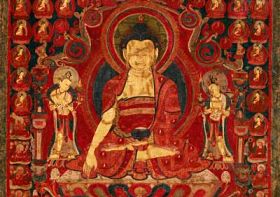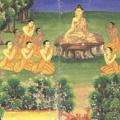9. Suffering and Smiling: the Buddha
Posted on
The Four Noble Truths of the Buddha, and the function they are supposed to play in our lives.
Themes:
Further Reading
B. Ñāṇamoli and B. Bodhi (trans.), The Middle Length Discourses of the Buddha (Boston: 1995).
Bhikkhu Bodhi (trans. ), The Connected Discourses of the Buddha (Boston: 2001).
A.D. Carpenter, Indian Buddhist Philosophy (Durham: 2014).
R. Gethin, The Foundations of Buddhism (Oxford: 1998).
R. Gombrich, What the Buddha Thought (London: 2009).
C. Gowans, Philosophy of the Buddha (London: 2003).
S. Hamilton, Early Buddhism: A New Approach. The I of the Beholder (London: 2000).
M. Siderits, Buddhism as Philosophy: an Introduction (Ashgate: 2007).
D. Webster, The Philosophy of Desire in the Buddhist Pāli Canon (London: 2005).

Origins


 ..
..



Comments
Will we also have an episode
Will we also have an episode (or, at least part of an episode) for Jainas?
In reply to Will we also have an episode by mehmet
Jainas
Funny you should ask, that's the next one we're working on. Actually the Jainas will be a recurring presence but they will first feature prominently in an episode that's coming up on non-violence in antique Indian thought. That should be episode 15 (after early Buddhism, the Mahabharata, and the Gita).
Bodhisattva
Hi Peter,
many thanks for your podcast in general and for this part on India in particular. You and Jonardon are doing a great service to both scholars and curious listeners.
I hope you don't mind, thus, if I join in with a small point of disagreement: In my opinion, your depiction of the Buddha "returning again and again until he was able to help other achieve enlightenment" applies to the Mahāyānic ideal of the Bodhisattva, but not to the concept of the Bodhisattva as we find it in the earlier Jātakas. In these stories of the Buddha's previous lives, instead, the Buddha-to-be (called "Bodhisattva") is depicted as a Buddha in the making, who acquires new virtues but might have occasional shortcomings. The idea that he voluntarily renounces nirvāṇa for the sake of others is, to the best of my knowledge, altogether absent there.
In reply to Bodhisattva by elisa freschi
Bodhisattva
Dear Elisa,
Ok, thanks for that correction - actually it seemed to me (as an amateur) that there is some tension with the stories of the Buddha on this and I guess you must be right that there is a kind of layering of later ideas over the earlier stories. I'll change the text for the book version.
Thanks!
Peter
The title of Gombrich's book
The title of Gombrich's book is 'What the Buddha Thought'.
'What the Buddha Taught' is a well-known introductory book by Walpola Rahula.
In reply to The title of Gombrich's book by Darryl Nightingale
Title
Oh thanks, we'll change that.
Translation of "dukkha"
One point where I slightly disagreed with the presentation was in the treatment of the term "dukkha" (suffering/dissatisfaction). I think the "payout" of translating dukkha as "dissatisfaction" rather than as "suffering" isn't to soften the concept (as suggested by the objection that "dukkha" must be something severe enough to be worth worrying about), but rather to deepen and generalize it. If "dukkha" is translated as "suffering" in the normal way the word is used, it could be thought that Buddhism is susceptible to disproof (or irrelevance) by sufficient social reform. Provide people with comfortable, safe and interesting lives, and even the pain of death (which anyway, can be largely mitigated by some combination of treatment, palliative care and euthanasia) can be reduced to a speedbump in an other fairly pleasant existence. Transmigration, then, would be nothing to worry about, since it just means the return to another fairly pleasant existence.
Translating "dukkha" as "dissatisfaction", on the other hand, draws attention to the idea that the source of dukkha isn't in contingent external circumstances, but in the will itself. This is emphasized in Buddha's fire sermon, where he emphasizes that the entire human being (internal senses, external senses, consciousness) is "burning". Any alleviation of suffering (in the ordinary sense) won't eliminate or even mitigate dukkha, which has its cause in the mind itself rather than in external things. A mind full of "passionate attachment" will just restlessly move from one thing to another. As soon as it has what it thought it wanted, it wants something else. If Budhha were alive now, I think he would find plenty of examples to reinforce his point in the lives of various "rich and famous" types who end up dying as a result of suicide or drug overdoses, and could point to the fact that economic development doesn't seem to do much to reduce social pathologies like depression, suicide and drug abuse.
In reply to Translation of "dukkha" by Ryan W
Dissatisfaction
Yes, that's a good point - this is surely what the proponents of that translation have in mind. Our point, if I remember this rightly (it was a while back!) was that the softening is an unwanted result of the translation. Like, why would you need to embark on something as radical as the Buddhist project just to avoid "dissatisfaction" which, to my ear at least, sounds like a word you'd use for, say, the fact that your coffee has a bit too much milk in it and not for the pervasiveness of death, illness, and so on that triggered Buddha's search for enlightenment. But on the other hand you are still right that "suffering" sounds a bit too narrow, so perhaps there is no really good English translation available.
In reply to Dissatisfaction by Peter Adamson
weary
No suitable english translation, though perhaps the German Romantic concept of Weltschmerz or world-weariness may come close? Though of course anachronistic, it does seem to point towards a sort of micro-/macro- cosmic conception in which the discontent of the individual is a mirror image of the world's various discontents, as well as the intractability of such a condition. A useful concept in any case!
A few notes for sharpening up the talk.
At around 8:20, "life of the householder" is to be understood as a man who leaves tradition behind. I would ask that this be corrected to person, people. Women and indeed non-binary people included. Women often became monks too back then. Also, the comments around the almond croissant may only be accessible to a privilege few in the rich white west, not to say that life is suffering wherever people cannot access these luxury items, more to point out the wording here sounded a little bit privileged. You could call me irritatingly PC or you could see that these minor corrections might make for a more accessible, inclusive and comfortable listen for all. Otherwise great podcast. Thank you
In reply to A few notes for sharpening up the talk. by L. Rebecca
Men and croissants
Well, the croissant thing is a running joke - if you listen to more episodes you'll see it comes up a lot as something I just happen to have a weakness for. So it is a joke at my own expense.
As for male/female, check out episode 16 of this series! There we talk about the complicated issues surrounding the inclusion of women in early Buddhist monasticism. Looking back at the script, I actually am not sure what you are referring to in this particular episode because I don't see any gender non-neutral language (the "he" in this paragraph refers to the Buddha, unless I am missing something). But actually when ancient Indian authors talk about householders and these householders becoming renouncers, they have in mind males not just primarily, but even to the exclusion of females, and it would be wrong to suggest otherwise. Again, this is discussed at length in episode 16, as are exceptions to this rule.
I actually am pretty careful about using non-gendered language as a general rule, as you will notice if you listen to more podcast episodes (though I may have gotten more careful over time; nowadays I usually go with "they" rather than "he or she" because of the non-binary issue, which was not so much on the radar back in 2010 when I started). So usually when I use male pronouns to make what may look like a general point, it is for a reason.
Question on karma
In an earlier episode I believe you said that there was no mention of the concept of karma in the Vedas, that the concept first appears not in the Aryan Indus or Punjab but in the Ganges valley (for reasons having to do the the mention of rice used in ritual). In this podcast you say that the discussion of karma appears in the Pali canon, possibly before its adoption by the brahminical teaching in the Upanishads. Are you saying, therefore , that the concept of karma may possibly have been pre-Aryan, pre-Hindu, pre-Buddhist? Could its origin be in the tribal cultures of India? (my guess is that this is impossible to determine, but I thought I would ask.)
In reply to Question on karma by hydr
Origin of karma
Well, that's not really a topic I can speak on with much expertise but bascially I think the answer is that there is a controversy about whether or not it is part of the culture that produced the earliest Vedas. The two sources I consulted on this when working on the Karma episode were these: H.W. Tull, The Vedic Origins of Karma: Cosmos as Man in Ancient Indian Myth and Ritual (Albany: 1989), J. Bronkhorst, Greater Magadha: Studies in the Culture of Early India (Leiden: 2007). So you could have a look at these.
Add new comment